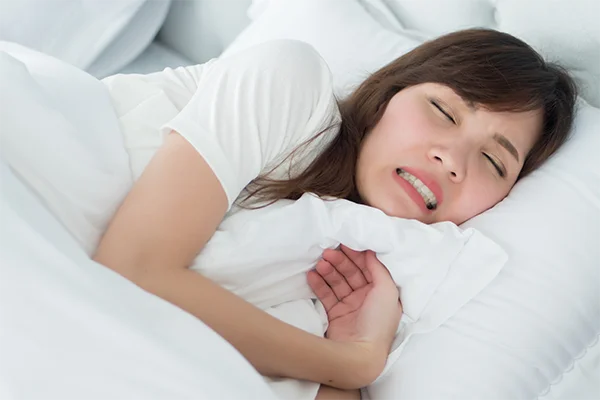Teeth Grinding Treatment Teeth grinding, also known as bruxism, is a common condition that can lead to serious oral health issues if left untreated. Many adults experience this problem, especially at night, and suffer from symptoms like jaw pain, worn teeth, and disrupted sleep. At Columbia Dental, we provide comprehensive bruxism treatment to protect your teeth and restore comfort. Teeth grinding, also known as bruxism, is a common condition that can lead to serious oral health issues if left untreated. Many adults experience this problem, especially at night, and suffer from symptoms like jaw pain, worn teeth, and disrupted sleep. At Columbia Dental, we provide comprehensive bruxism treatment to protect your teeth and restore comfort.Understanding Teeth Grinding (Bruxism)Bruxism is the involuntary grinding or clenching of teeth, which can occur while awake or asleep. Sleep bruxism is often more severe, as it occurs unconsciously and can continue unchecked for hours. Grinding refers to moving the teeth against each other with force, while clenching is holding the teeth tightly together. Both can result in significant dental damage over time. Common symptoms of bruxism include:
Bruxism can stem from various causes, including stress, anxiety, sleep disorders like sleep apnea, bite misalignment, or lifestyle factors such as high caffeine or alcohol consumption. It is most common among adults experiencing chronic stress or poor sleep quality. Why Teeth Grinding Needs Professional TreatmentWhile occasional grinding may not seem harmful, untreated bruxism can lead to long-term oral health problems. These include cracked teeth, gum recession, and TMJ disorder—a painful condition affecting the jaw joint. A dental exam] is crucial to determine the severity of the issue and identify its underlying causes. Our dentists use bite analysis and jaw assessments to tailor treatments based on your specific needs. Store-bought mouth guards may provide minimal protection, but they often fail to fit properly or address the root cause. Custom dental solutions offer far more effective and lasting relief. Custom Night Guards – First Line of DefenseA custom night guard is a dental appliance designed to protect your teeth from damage caused by grinding or clenching during sleep. These guards are made specifically to fit your bite, providing a comfortable and secure barrier between your upper and lower teeth. Key benefits of custom night guards include:
The process involves taking dental impressions, fabricating the appliance in a specialized lab, and adjusting the fit during a follow-up visit. Options include soft guards for mild cases and hard acrylic guards for more severe grinding. Proper care—such as daily cleaning and storing the guard in a ventilated case—extends its lifespan. Additional Bruxism TreatmentsIn cases where night guards alone are insufficient, our dental team may recommend additional treatments:
These treatments are customized to match the severity and cause of each patient's condition, ensuring comprehensive and effective care. When to See a Dentist About Teeth GrindingIf you’re experiencing persistent jaw discomfort, tooth damage, or disrupted sleep, it’s time to see a dentist. Other signs that require professional intervention include:
During your visit, our dental team will assess your bite, evaluate muscle tension, and examine your teeth for signs of wear. Early diagnosis and personalized treatment are essential for protecting your long-term dental health. Protect Your Smile – Schedule a Consultation TodayDon’t let teeth grinding compromise your comfort and oral health. At Columbia Dental, we offer proven solutions like custom night guards and comprehensive bruxism treatment options to help you live pain-free and sleep better. Our fitting process is simple, and we’re happy to discuss insurance and payment options to make treatment accessible. Reach out to us at (860) 743-9032 to learn more about protecting your smile. FAQsWhat is bruxism and how do I know if I have it?Bruxism is the involuntary grinding or clenching of teeth, often occurring during sleep. Common signs include jaw soreness, tooth sensitivity, worn-down teeth, and frequent headaches, especially in the morning.Are custom night guards better than store-bought ones?Yes, custom night guards are professionally made to fit your bite precisely, offering superior comfort, durability, and protection compared to over-the-counter options, which may be bulky or ineffective.Can bruxism cause permanent damage if untreated?Yes, untreated bruxism can lead to cracked or worn teeth, gum recession, chronic jaw pain, and the development of TMJ disorder, all of which may require extensive dental treatment to correct.What causes teeth grinding during sleep?Teeth grinding during sleep can be caused by stress, anxiety, bite misalignment, sleep disorders like apnea, and lifestyle habits such as caffeine or alcohol consumption. |